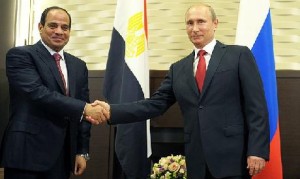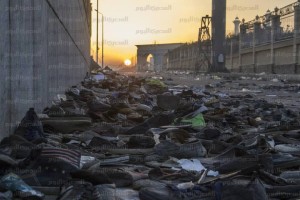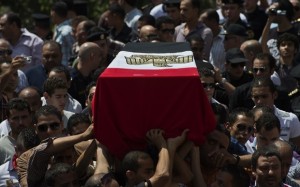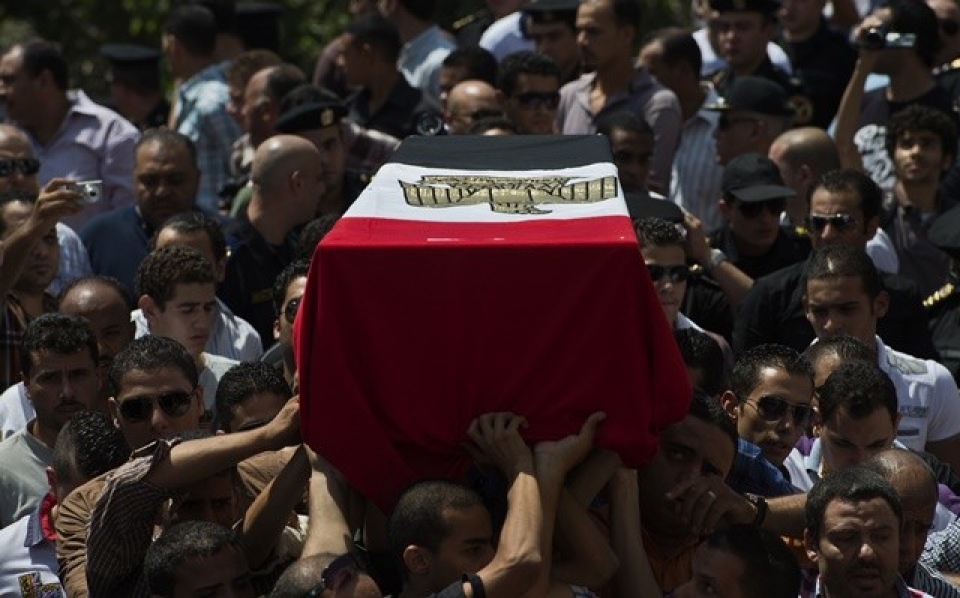 When Vladimir Putin came to Egypt on an official state visit this week, he was greeted with much pomp and fanfare.
When Vladimir Putin came to Egypt on an official state visit this week, he was greeted with much pomp and fanfare.
Portrayed in the media as a welcome ally in Egypt’s fight against extremism, the Russian president – who is currently embroiled with the West over who “owns” the Ukraine – presented Egyptian President Abdulfatah al-Sisi with an interesting gift: an AK-47 assault rifle.
Symbolically, it was the most fitting present exchanged between two statesmen who have not shied away from using excessive force in handling conflicts. Putin didn’t hand his Egyptian counterpart a medal of friendship or a commemorative plate of cooperation, but a weapon. This speaks volumes about the state of our nation, but more importantly it sheds a light on the state of our society: Violence has become very much part of our daily lives.
 Last week saw the death of 22 Zamalek supporters (mostly from the Ultras White Knights) while trying to watch their team’s game at the Air Defense Stadium. Since “investigations” are pending (it takes an Egyptian to know that as soon as the word “investigation” is used nothing will come of it), it is yet to be determined why the police decided to force spectators through a small iron tunnel surrounded by barb wire, or why they decided to fire tear gas into the crowd, creating a stampede in what can only be described as an act of pure stupidity, if not intentional harm.
Last week saw the death of 22 Zamalek supporters (mostly from the Ultras White Knights) while trying to watch their team’s game at the Air Defense Stadium. Since “investigations” are pending (it takes an Egyptian to know that as soon as the word “investigation” is used nothing will come of it), it is yet to be determined why the police decided to force spectators through a small iron tunnel surrounded by barb wire, or why they decided to fire tear gas into the crowd, creating a stampede in what can only be described as an act of pure stupidity, if not intentional harm.
As if that wasn’t enough, this Sunday saw the death of 21 Egyptians at the hands of the Islamic State in Libya. The usual Guantanamo orange jumpsuits, a self-righteous sermon addressed to the “evil West”, and the subsequent slaughter.
But the real tragedy is not only the death of 21 workers, or the football fans before them. It is not the absurdity and sickening brutality with which people are losing their lives. The real tragedy is that death has become a normal, acceptable, part of daily life.
The tragedy is the numbness. Where in the past you would look at the pictures of the dead with your eyes covered, now you flick through them like a friend’s photo album.
Our dinner discussions now revolve around how people are slaughtered, how the ISIS method is different from the public beheadings in Saudi Arabia, according to the material we get exposed to on a regular basis. We have not forgotten our humanity, but the continuous violence has made us so pragmatic that we think of death in technical terms.
We weren’t always like that. The Port Said massacre of 2013 was a tragedy, but after 20 tragedies you start to turn the page and look for something that lifts your spirits. We have turned the page so often that nothing is left but the abyss, and it is staring right back at us.
We are going from one state of mourning to the next. It begs the question if we should keep the flags at half-mast permanently.
 Human life never had a high value in Egypt – unless you’re a tourist – but since the 2011 uprising, the value of life has become so low that football fans get crushed to death and instead of popular outrage, they get blamed for not carrying tickets. Even if the victims were unarmed and executed in broad daylight while filmed – like the painful example of Shaimaa al-Sabbagh – victim-blaming is so prevalent that the idea of “dying for a cause” has become absurd.
Human life never had a high value in Egypt – unless you’re a tourist – but since the 2011 uprising, the value of life has become so low that football fans get crushed to death and instead of popular outrage, they get blamed for not carrying tickets. Even if the victims were unarmed and executed in broad daylight while filmed – like the painful example of Shaimaa al-Sabbagh – victim-blaming is so prevalent that the idea of “dying for a cause” has become absurd.
If you tune in to state media, answering violence with violence is justified, and most of the time the dead are to blame for standing in front of the police’s rifles. The joke of “he hit my fist with his face” has become reality. Fascism is not just the norm, but the expectation.
Remember the part in Hotel Rwanda that gave you goosebumps when radio announcers would call on the people to kill the “cockroaches”? That’s the country you are living in today, post-revolutionary Egypt in the year of 2015.
How many times have you heard the words “dogs, traitors, spies, animals, filthy insects” on TV? Hate speech is regular speech. TV pundit Amr Adeeb’s first reaction to the Libyan massacre: “We need to answer. I want to see dead people!”
The line between patriotism and fascism is so thin that they are easily mixed up, and with the current news cycle reporting perpetually depressing events, it is simple to forget our own humanity.
I would have loved to close this piece with an uplifting note, but it is down to us as individuals to remember that if we become completely numb to tragedy, we don’t need a state to devalue human life. We are doing it ourselves.
WE SAID THIS: Don’t miss ” You Won’t Believe How Many Egyptians Have Been Killed in Egypt So Far This Year“



